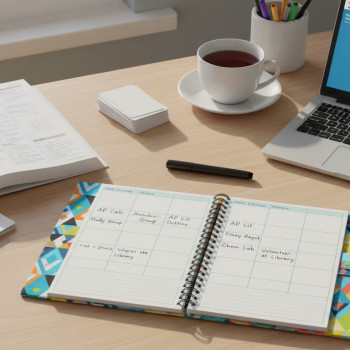Holiday Strategy: Celebrate Festivals Without Falling Behind on AP Prep
Holidays come with the unmistakable scent of cinnamon, the glow of fairy lights, and invitations to put your feet up. For AP students, they also bring a quieter, more complicated feeling: the tug between celebrating the season and staying on top of Advanced Placement coursework. The good news? You don’t have to choose one or the other. With a realistic plan, a few focused rituals, and smart use of resources — including Sparkl’s personalized tutoring when you need an academic safety net — you can enjoy festivals and still arrive at exam season confident and prepared.
Why holidays often feel like a study trap
Holidays are disruptions by design. Routines are delightful targets for disruption: meals shift, bedtimes slide later, family obligations multiply, and your brain (bless it) craves the vacation. Add AP coursework — which asks you to learn college-level material, master skill sets, and sometimes complete cumulative projects — and it’s easy to feel overwhelmed or guilty.
But guilt doesn’t help learning. What does help is an approach that honors both celebration and study. Treat studying like a respectful guest at your holiday table: brief, intentional, and politely timed.

Core principles for a holiday-friendly AP study plan
Before we build schedules and checklists, anchor yourself to these principles. They’re quick to remember and powerful in practice.
- Quality, not quantity: Short, intentional study sessions beat long, distracted marathons.
- Consistency over intensity: Daily micro-habits keep knowledge fresh and reduce last-minute panic.
- Focus on weaknesses: Use holiday time to plug holes rather than re-reading things you already know.
- Practice under conditions: Do at least one timed practice (or Bluebook preview for digital exams) during the break to simulate exam conditions.
- Be kind to yourself: Celebrate the wins — a problem solved, a chapter completed — and allow real breaks without checklist guilt.
Designing a realistic holiday schedule
A holiday schedule should feel like an accessory to your celebrations, not a burden. The goal is a plan that’s visible, flexible, and review-focused. Below is an adaptable template you can customize for a 10–14 day holiday stretch. Use it as a baseline and tweak it to match your exam calendar, course load, and family plans.
Sample 10-day holiday schedule (flexible template)
| Day | Morning (30–45 min) | Afternoon (30–60 min) | Evening (30–45 min) |
|---|---|---|---|
| 1 | Light review: course outline & priority list | Targeted practice: one weak topic (timed) | Summarize key formulas/terms |
| 2 | AP Daily video or short lecture | Practice questions (10–15) | Flashcard review |
| 3 | One timed free-response practice | Review mistakes with notes | Relaxed reading or concept mapping |
| 4 | Group study or tutoring session | Practice questions on a different unit | Quick summary of the day’s learning |
| 5 | Past-question drill | Concept review, fill gaps | Free time — full break night |
| 6 | AP Daily recap or targeted video | Practice quiz (progress check) | Flashcards and spaced repetition |
| 7 | Timed section simulation | Review incorrect items | Plan next week’s study targets |
| 8 | One problem set on weak area | Tutor or teacher check-in | Active recall session |
| 9 | Review summary sheet | Mixed practice set | Relax and reflect |
| 10 | Final quick diagnostic | Light review & next steps | Celebrate progress |
This template assumes short bursts of study each day. If you have long travel days or special events, swap or compress sessions — the flexibility is the point. Also, sprinkle in small rewards (a favorite snack, a short walk) after study blocks so studying becomes associated with pleasure, not punishment.
What to study during holiday time — prioritization guide
With limited hours, prioritize tasks that give the most return for attention. Think of your learning in three tiers.
Tier 1 — High Impact (do these first)
- Past free-response questions for your specific AP subject — learn the rubric language and scoring style.
- Timed practice sections to build pacing and stamina.
- Review of historically high-value topics (e.g., foundational theorems in Calculus, key historical periods for APUSH, common grammar and composition patterns for English).
Tier 2 — Medium Impact (fill in gaps)
- Targeted practice on topics that trip you up — not everything deserves equal time.
- AP Daily videos or short concept refreshers that clarify tricky ideas.
- Problem-solving strategies: how to approach data analysis, how to structure a long essay, time-saving calculator techniques.
Tier 3 — Low Impact (optional, use if time remains)
- Re-reading full textbook chapters (inefficient unless paired with active work).
- Polishing notes that are already strong.
- Low-yield trivia unless your course specifically emphasizes it.
Active study methods that work on holiday schedules
Passive reading feels safe but rarely transfers to long-term recall. Swap passive minutes for active techniques that map well to short sessions.
- Spaced repetition: Return to the same concept multiple times across days; flashcards or apps are perfect for this.
- Interleaving: Mix topics in one study block so you practice switching and applying skills across contexts.
- Self-explanation: Talk through a solution out loud as if teaching someone else — this doubles as a rehearsal for explaining answers on free-response sections.
- Practice under constraints: Simulate time limits, calculator rules, or document-based question constraints to reduce surprises on exam day.
- Reflection & error logs: Keep a short log of mistakes and why they happened so you can target them systematically.
How to take advantage of AP Classroom and other official resources
The College Board offers free, high-quality materials — AP Daily videos, Topic Questions, progress checks, and the AP Question Bank — many of which are designed for quick, focused review. During holidays, these tools are especially useful because they’re modular and exam-aligned.
- Use AP Daily videos for a 10–15 minute refresher right before a practice session.
- Ask your teacher to unlock progress checks for targeted practice during the break.
- When possible, do at least one Bluebook or digital test preview, so you know how test navigation feels on exam software.
Tip: Pair an AP Daily video with a short practice set afterward. The video primes the brain; the questions confirm whether the idea stuck.
Working with tutors during the holidays — when and how it helps
Holidays are a great time for a few high-leverage tutoring sessions. You don’t need weekly 90-minute blocks to benefit. A focused 1-on-1 session can transform a sticky concept into something manageable and remove weeks of wasted effort.
- Book a session to target a stubborn unit (e.g., kinetics in Chemistry, thesis structure in English, statistical hypothesis testing in Psychology).
- Use a tutor to simulate exam conditions or to perform a mock scoring session for a free-response practice.
- Ask for a tailored holiday plan — a few clear assignments you can complete between sessions.
Sparkl’s personalized tutoring can fit naturally here: a short set of targeted 1-on-1 sessions, an individualized study plan for the break, and AI-driven insights that show which practice items will move the needle fastest. If you feel stuck or anxious, a few smart sessions can create momentum and give you confidence to enjoy the celebrations.
Practical tips for staying healthy and focused
Studying during holidays isn’t just an academic challenge — it’s a lifestyle negotiation. Use these practical habits to keep energy and focus intact.
- Keep a steady sleep window. If not the same bedtime, aim for the same wake time most days to preserve circadian rhythm.
- Move your body. Even short walks or 10-minute stretching breaks refresh concentration and clear the mind.
- Hydrate and eat protein-rich snacks to avoid mid-study sugar crashes.
- Guard your most productive hours. If you’re a morning person, reserve that first hour for your toughest task.
- Use the two-minute rule: if a task takes two minutes or less (like summarizing one paragraph), do it now so momentum grows.
Dealing with travel, parties, and family obligations
Travel days and long family gatherings can ruin a study streak — unless you plan for them. Think in flexible windows and portable tasks.
- Download short AP Daily videos or practice packs for offline viewing if you’ll be traveling without reliable Wi-Fi.
- Carry a small, portable study kit: one notesheet, flashcards, and a practice question packet you can complete while someone else is driving.
- Communicate boundaries to family: a polite, short explanation like, “I’m studying for a quick hour so I can relax guilt-free later,” usually works wonders.
- Use pockets of time (waiting, transit, between events) to do micro-review, not deep work. Micro-review builds consistency without stealing celebration time.
Measuring progress: simple trackers that actually work
During the holidays, it’s tempting to judge progress by hours logged. Instead, measure by evidence of learning. Use two lightweight trackers: a performance tracker and a confidence tracker.
| Tracker | What to record | Why it matters |
|---|---|---|
| Performance | Score on timed practice, # of questions correct, common error types | Shows tangible gains and reveals patterns to fix |
| Confidence | Rate topics 1–5 for confidence daily | Tracks subjective readiness and emotional trends |
At the end of a holiday stretch, compare your latest timed practice with an earlier one. Small score improvements are wins; if improvements are flat, adjust tactics (e.g., fewer passive reads, more targeted practice). If anxiety spikes, short tutoring check-ins — like those offered by Sparkl — can re-center a study plan and provide coping strategies for test-day nerves.
Sample micro-review activities you can do anywhere
- Flashcard sprints: 10 minutes of active recall on weak terms.
- One-question deep dives: pick a challenging problem, explain each step in writing or out loud.
- Two-minute summaries: summarize a concept in two sentences — clarity forces mastery.
- Quick rubric review: for free-response tasks, read the scoring guide and rewrite high-level expectations in your own words.
When to unplug completely
Unplugging is not failure — it’s fuel. Your brain consolidates learning during rest, especially sleep. If you notice diminishing returns (longer study sessions with less retention), schedule full unplug days. Make them real: no guilt, no half-work. A true break will make the next study session exponentially better.
Putting it all together: a flexible holiday action plan
Here’s a compact, three-step action plan you can implement today to balance celebrations and meaningful AP progress.
- Map the holiday: Write down fixed events and travel days first. These are nonnegotiable anchors.
- Identify two study goals: One performance goal (e.g., improve timed section score by X%) and one knowledge goal (e.g., master three key topics).
- Choose 15–30 minute daily rituals: A morning micro-review and an evening consolidation that total 30–60 minutes a day. Add one longer practice (timed or tutor session) mid-break.
Sparkl’s personalized tutoring fits naturally into this plan: one remote 1-on-1 session to diagnose weaknesses, a tailored set of practice tasks for the break, and AI-driven progress checks that tell you where to focus next. You get guided momentum and still keep the holidays for what they are: memory-making time.
Final thoughts — the holiday advantage
Here’s a secret many students miss: holidays are an opportunity, not an obstacle. With lighter schedules and a break from regular school rhythms, you can do focused review without the constant churn of classes. The key is to be intentional. Choose high-impact tasks, keep sessions short, and treat rest as part of the strategy.
Celebrate well. Study smart. And if you ever need targeted support, a few sessions of personalized tutoring—paired with a clear, compact plan—can preserve both your grades and your holiday spirit. Most students who use the break well find themselves less stressed in January and more confident as the AP season approaches.
Have a festival-filled holiday, and when the lights dim and the exams draw near, you’ll be ready: rested, practiced, and proud of how you balanced both.















No Comments
Leave a comment Cancel